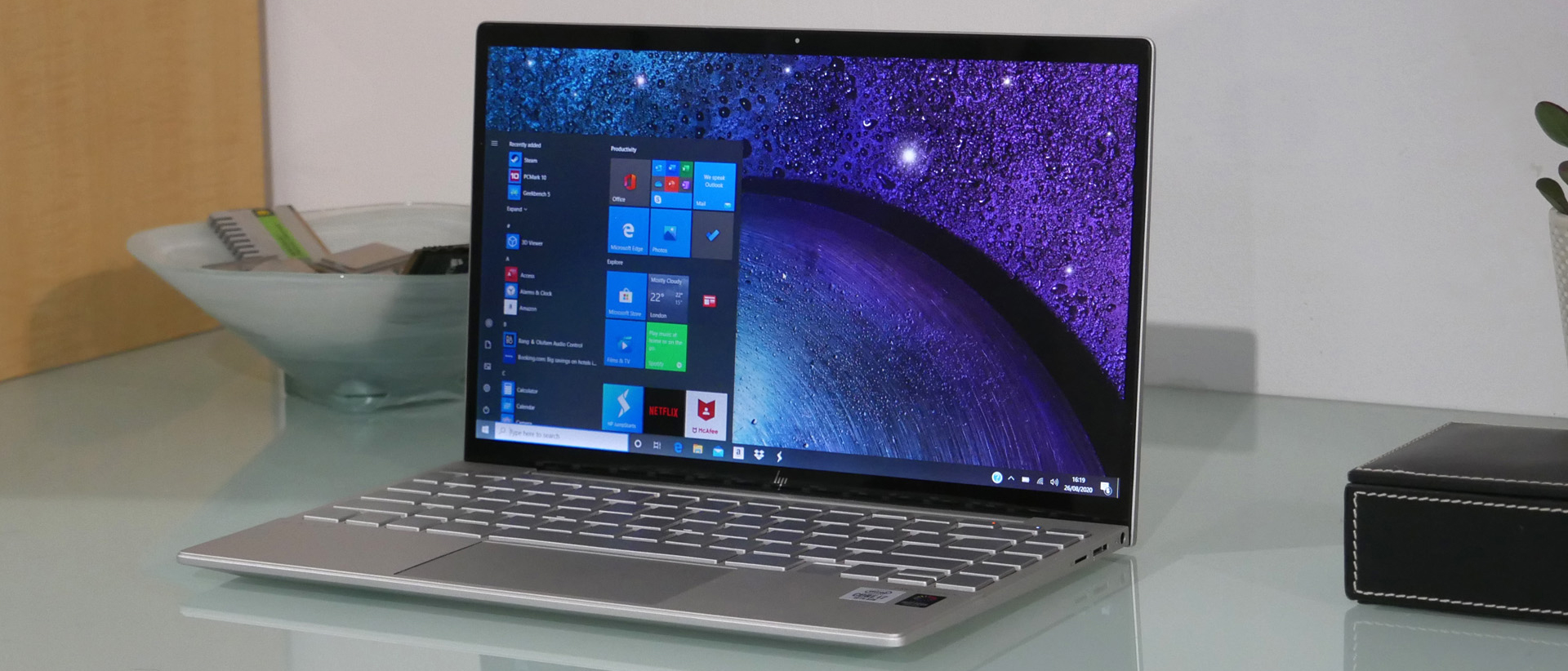TechRadar Verdict
HP has refreshed its compact Envy 13 laptop for 2020 with slimmer bezels and the latest 10nm Intel CPUs, but the absence of USB-C charging is a let down.
Pros
- +
The latest Intel CPU tech
- +
Compact all-metal chassis
- +
All-day battery life
Cons
- -
AMD mobile CPUs are even faster
- -
Bouncy keyboard
- -
No USB-C charging
Why you can trust TechRadar
Two-minute review
We give you the HP Envy 13, refreshed for 2020. HP’s slightly cheaper, marginally chunkier answer to the all-conquering Dell XPS 13. Configured here with a quad-core variant from Intel’s very latest 10nm Ice Lake family of CPUs, the broad idea is 13-inch portability without compromising performance.
The first half of that equation is largely delivered. The HP Envy 13 is a few millimetres thicker than the Dell XPS 13. But it remains an eminently portable PC. Overall proportions are kept in check by slim bezels on each side of the display and slightly larger screen borders above and below. The top bezel allows for a 720p webcam with a useful privacy cover enabled with a keystroke.
Again, while Dell does it slightly better when it comes to bezel shrinkage, the HP Envy 13 ain’t bad. As we’re drawing marginally uncomfortable comparisons with that trend-setting Dell, the HP Envy 13 also can’t quite compete for pure style and build quality.
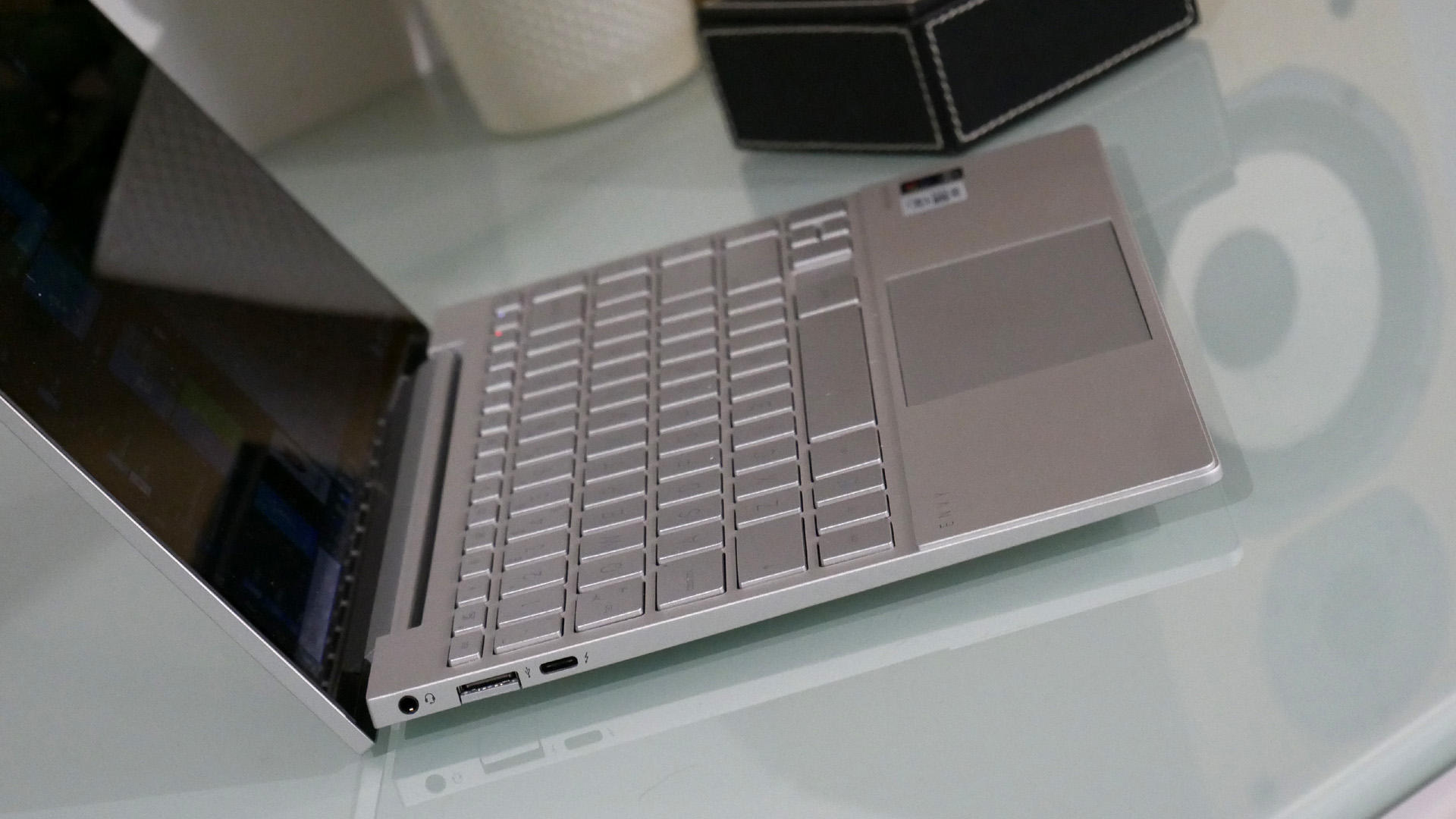
Make no mistake, it’s good by both measures. The all-metal chassis feels rigid and looks contemporary thanks to its sandblasted anodised finish. But there’s more bounce from the keyboard than we’d like and the plastic trackpad feels a little low rent compared to glass alternatives. Overall, the HP Envy 13 is a nice system, but not quite from the very highest drawer.
Speaking of near victories, that applies to the fully touch-enabled 13-inch display, too. In some regards it’s a corker. 1080p native resolution plus IPS tech and 1000nits claimed brightness looks awfully promising on paper. The problem is surprisingly poor viewing angles as a consequence of a fairly bad case of what’s known in the trade as IPS glow. It’s not a total deal breaker, but it is disappointing and undermines what is otherwise a really zingy, punchy and accurate panel. For the record, however, the sound quality from the Bang&Olufsen audio solution is very pleasing for a 13-inch laptop.
Next up, ports. In the plus ledger, you get a pair of hinged USB-A sockets for legacy and a single USB-C socket supporting Thunderbolt 3. Unfortunately, the latter can’t be used to charge the HP Envy 13, something that’s achieved via a barrel connector that doesn’t feel terribly robust. That’s a pity because one of the major benefits of USB-C is cross compatibility. The ability to carry a single charger to juice up multiple devices has become one of life’s small mercies. Unfortunately, the HP Envy 13 cannot participate.
As for battery life, there’s good news in the shape of over 10 hours in the very demanding PCMark 10 test. This is a true all-day device in other words. Well, it is so long as you don’t run anything really demanding. Like many laptops based on the latest Intel CPUs, the HP Envy 13 runs a little hot and heavy, accompanied by plenty of fan noise, under load.
Sign up for breaking news, reviews, opinion, top tech deals, and more.
Here is the HP Envy 13 (2020) configuration sent to TechRadar for review:
CPU: 1.3GHz Intel Core i7-1065G7 (quad-core, 8MB cache, up to 3.9GHz with Turbo Boost)
Graphics: Intel Iris Plus
RAM: 8GB DDR4
Screen: 13-inch, IPS, 1080p, multi-touch
Storage: 1TB Intel SSD
Optical drive: N/A
Ports: 2x USB-A, 1x USB-C with Thunderbolt 3, MicroSD card reader
Connectivity: Wi-Fi 6 AX, Bluetooth 5.0
Camera: 720p with shutter
Weight: TK pounds (1.3kg)
Size: 12.1 x 7.66 x 0.67 inches (30.65 x 19.46 x 1.69 cm; W x D x H)
Price and availability
This specific configuration weighs in at £949 in the UK but currently isn’t available in the US or Australia. Bet on pricing around $950 in the US and $1,700 in Australia.
At that price point, it significantly undercuts the latest Dell XPS 13. That kicks off at well over $1,000 / £1,000 but with a Core i5 rather than i7 chip and a smaller SSD.
Of course, the Dell is that bit sleeker, that bit slimmer of chassis and bezel. So, it’s a case of weighing up how much you value a few millimetres of chassis thickness or that ultra-slim bezel look.
In simple terms, the HP Envy 13 is positioned pretty precisely in the market. It’s a strong all rounder for the money. There are superior alternatives. But they’ll cost you more.
Design
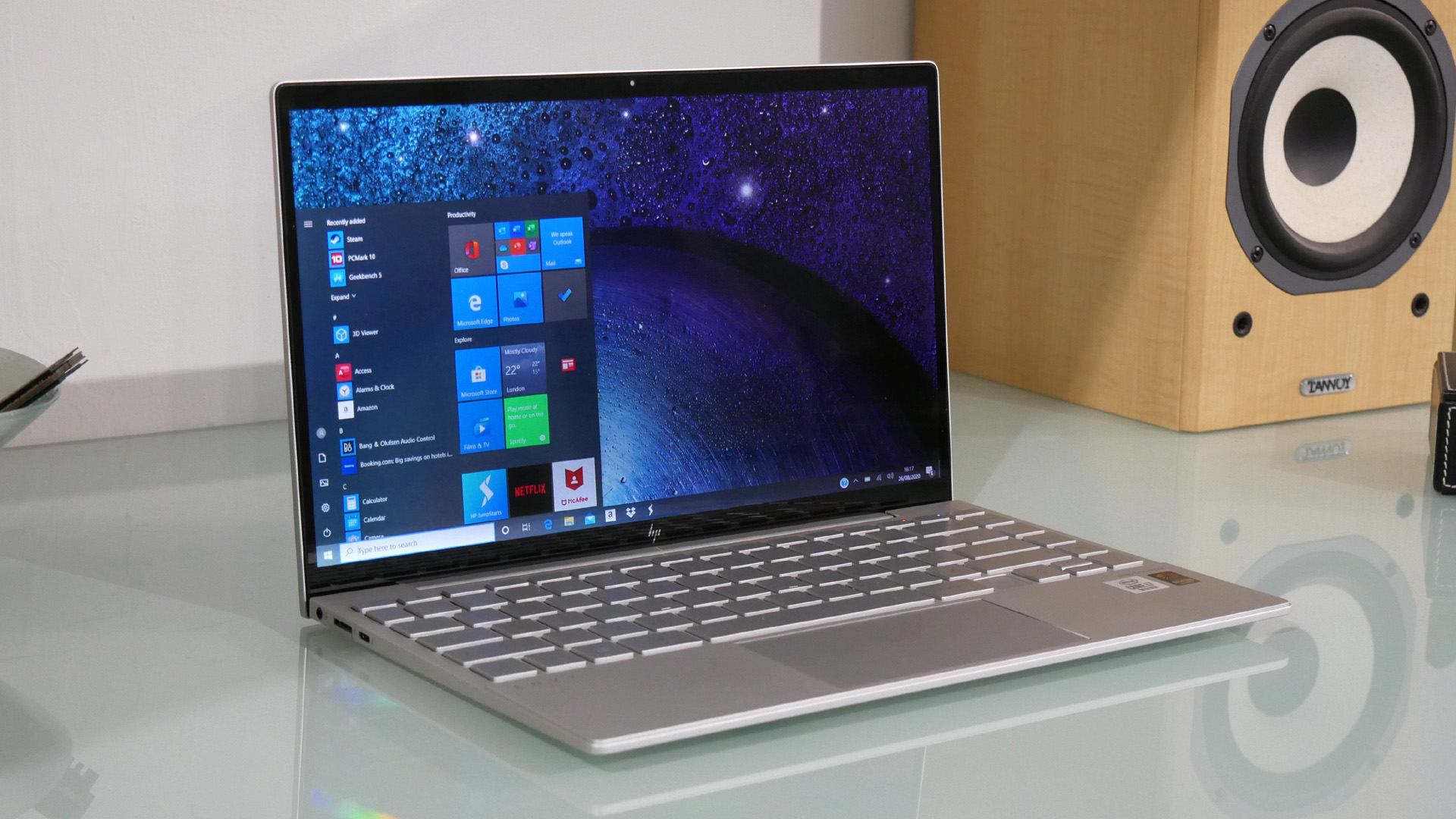
Rounding out the main features, you also get a microSD card reader and a fingerprint reader for swift but secure access.
For 2020, HP has shrunk the bezels on the Envy 13, particularly the lower bezel or chin - that used to be fairly fat. But it hasn’t gone quite as far as the likes of Dell’s latest XPS 13, which has reduced bezel size to almost vanishing proportions.

The consequence is that the HP Envy 13 can’t quite compete when it comes to want and wow factors. Its metal chassis with sandblasted anodised finish remains appealing. But some details do let it down. The keyboard bed flexes more than we would like, robbing the laptop of a really premium feel. The same goes for the plastic trackpad. If you’re used to the smooth slickness of a glass trackpad, it’s a bit of a let down.
That said, this is still an eminently portable laptop that weighs just 1.3kg and measures a mere 30cm across. The chassis is also generally rigid, despite the bouncy keyboard, and the screen hinge reassuringly firm. Speaking of the screen, just above it you’ll find a 720p webcam augmented by a switchable shutter for privacy. In some ways, that’s a nice touch - the ability to shutter the camera at a keypress. But it does raise the prospect of a system hack providing access to the shutter function. Ultimately, a manual shutter would remove all doubt.
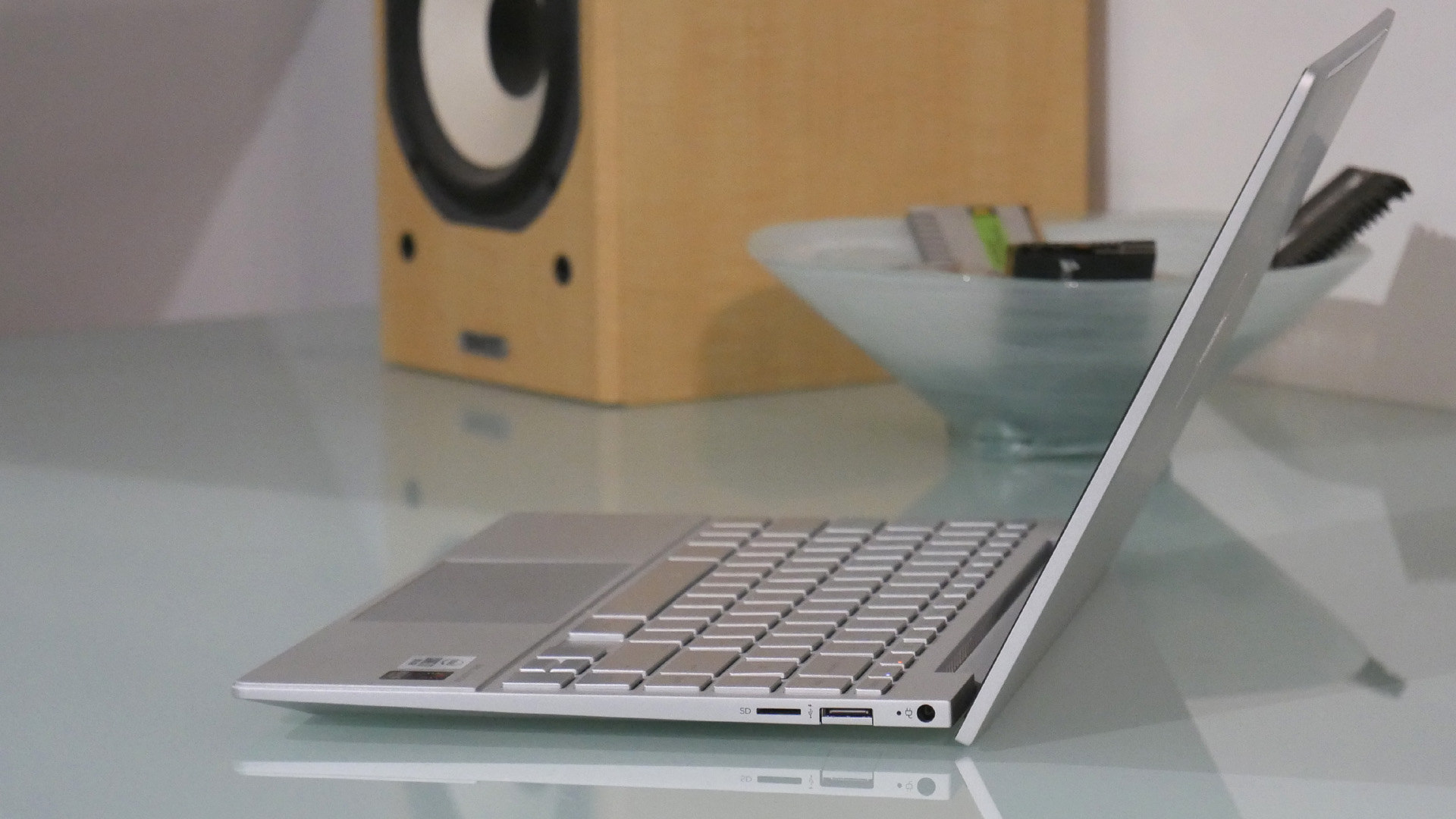
Ports wise, the HP Envy 13 packs a pair of hinged USB-A ports, on either side of the chassis, delivery good connectivity to legacy devices. There’s also a USB-C port with full Thunderbolt 3 support, which is great.
Less edifying is the fact that it doesn’t support charging the laptop. So, there goes any hope of using a single power adapter to charge the Envy 13 and other devices. Pity. That the barrel connector for the bundled charger feels a bit flimsy when inserted doesn’t help.
Performance

Here's how the HP Envy 13 performed in our suite of benchmark tests:
3DMark: Sky Diver: 7541; Fire Strike: 2043; Time Spy: 777
Cinebench CPU: 1,510 points
GeekBench 5: 1,352 (single-core); 4,099 (multi-core)
PCMark 10 (Home Test): 4172 points
PCMark 10 Battery Life: 10 hours and 53 minutes
Battery Life (TechRadar movie test): 10 hours and 12 minutes
It’s a little tricky to be entirely upbeat about the performance of Intel’s 10nm Ice Lake CPUs. The HP Envy has just such a chip inside, namely the quad-core Intel Core i7-1065G7 model.
In isolation, it’s a great chip, with four of the most advanced processor cores available from Intel. All-round system performance is pretty snappy, too. While this wouldn’t be a suitable portable rig for really hardcore content creation, it turns an able hand to a spot of rendering or image editing.
The problem is the knowledge of what might have been. And also the alternative from AMD. Ice Lake chips don’t clock terribly high, in this case up to a maximum of 3.9GHz and in practice a fair bit lower than that with multiple cores loaded. Even so, the HP Envy is prone to whirring up its fans.
More problematic is the comparison to AMD’s fantastic 7nm Renoir APU, branded Ryzen 4000. With up to eight cores and fantastic efficiency, Renoir is rather showing up the limitations of Intel’s 10nm process.
On the plus side, Intel’s latest integrated Iris Plus graphics is certainly a major step in the right direction. OK, this is still no serious gaming portable. And we did have driver issues with some games, which is unfortunately not uncommon with Intel integrated graphics. But the Envy 13 will just about get the job done for some casual fun if you reduce the in-game graphics settings.
It’s also worth noting that while the Envy’s 13-inch IPS screen does impress with its peak brightness, it also suffers from disappointing viewing angles thanks to a bad case of IPS glow.
Battery life
One area where we have few reservations is the HP Envy 13’s battery life. By surviving for over 10 hours in the demanding PCMark 10 test, it proved itself capable of true all-day battery life. In fact, you can expect quite a bit more than 10 hours in a typical light web browsing and document editing scenario.
The one possible exception to that would be the very heaviest workload loads. Those 10nm Intel chips don’t run particularly cool or efficiently.
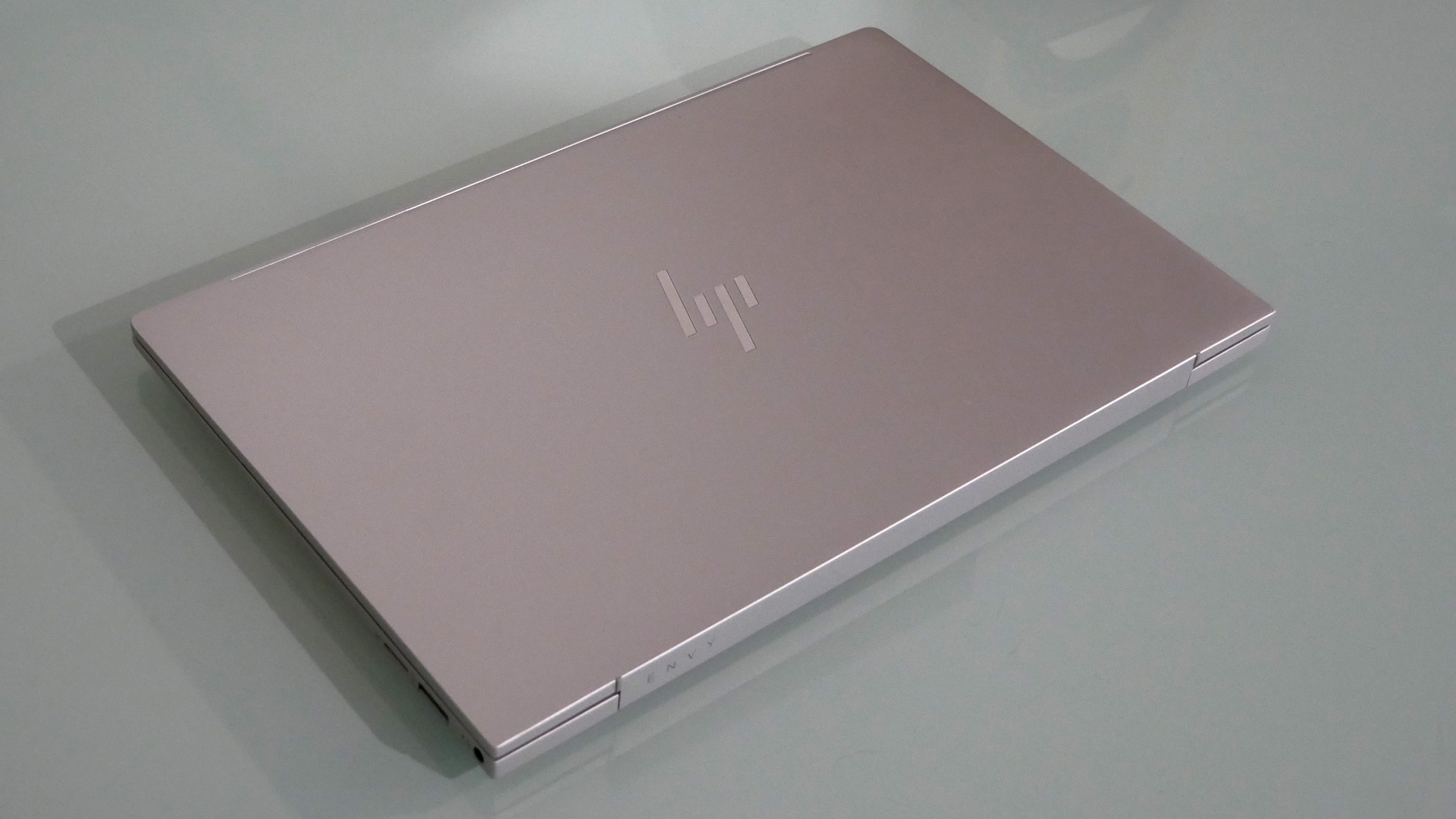
Buy it if...
You want a slim, stylish, compact 13-inch notebook
Not only that, but the HP Envy 13 also looks good and has a quality metal chassis while undercutting some of the most obvious competition on price. The HP Envy 13’s build isn’t perfect, but it is good.
You’re after Intel’s latest 10nm process technology in a compact package
The HP Envy 13 has Intel’s 10nm Ice Lake in quad-core configuration. They’re the most advanced Intel CPU cores you can currently buy.
You’re looking for a laptop with true all-day battery life
The HP Envy achieves over 10 hours in the demanding PCMark 10 battery test. For lighter workloads, like web browsing and document editing, it’ll last even longer.
Don't buy it if...
You demand the last word in vanishingly small bezels and ultra-sleek design
HP has reduced the Envy’s bezels for 2020, especially the chin, but the result doesn’t push the boundaries like Dell’s XPS 13.
You want the best possible mobile performance in a compact package
Despite using Intel’s latest 10nm Ice Lake CPUs, the HP Envy 13 is off the pace compared to alternatives running AMD’s 7nm Ryzen 4000 processor.
You want to use a single power adapter to charge all your mobile devices
The HP Envy 13 does have USB-C with Thunderbolt 3 support. But you can’t use the socket to charge the device itself.
Upgrade your tech for less with our HP coupons. Find great deals on laptops, printers, and more.
- These are the best laptops of 2020
Technology and cars. Increasingly the twain shall meet. Which is handy, because Jeremy (Twitter) is addicted to both. Long-time tech journalist, former editor of iCar magazine and incumbent car guru for T3 magazine, Jeremy reckons in-car technology is about to go thermonuclear. No, not exploding cars. That would be silly. And dangerous. But rather an explosive period of unprecedented innovation. Enjoy the ride.
